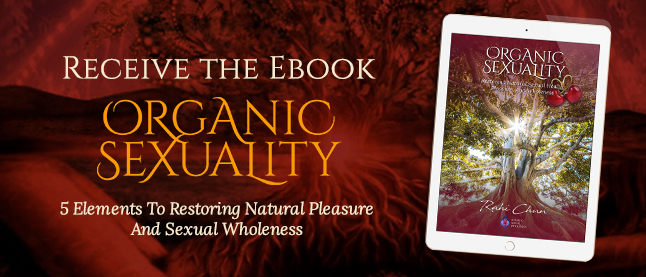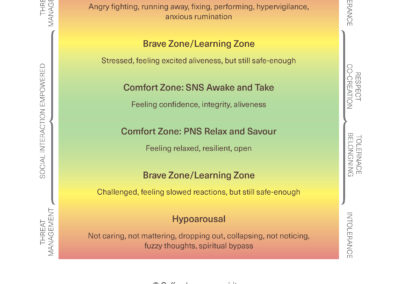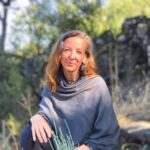
Caffyn Jesse Returns to Share About “Intimacy Educator,” “Ecstatic Belonging,” and Cautious Considerations Combining Sexological Bodywork and Psychedelics
Share this episode:
I had known about Caffyn through her wise and wonderful “Science for Sexual Happiness” & “Erotic Massage” books and teachings before sharing zoom gatherings with them when I was invited to teach webinars for the Institute for the Study of Somatic Sex Education some years later. After interviewing her on this podcast 2 years ago, they invited me to co-create a retreat with them at their home on Salt Springs Island exploring the benefits psychedelic medicines can bring to sexological bodywork. The personal expansion and professional understanding this led to inspired us to expand the container the following year when we co-held a space for 7 sexologists to gather and explore the same inquiry. I am honored to be exploring this inquiry and traveling this path of the “outlaw” with them.

Caffyn Jesse is a queer elder, sacred intimate, teacher and writer who revels in the power and pleasures of the erotic. They are a renowned teacher of sex, intimacy and healing trauma with pleasure – encouraging neuro-plastic change to support sexual healing and expanded pleasure, unwinding sexual trauma, exploring the intersection of sex and spirit, creating erotic community are all core to their work and play. Caffyn is a tireless advocate of embodied love.
Caffyn offers an Intimacy Educator teaching in an online program on The Art and Science of Sacred Intimacy. They host regular “office hours” where you can meet, connect and ask questions. They also offer a program on psychedelic medicine integration.
Caffyn’s books include Love and Death in a Queer Universe, Elements of Intimacy, Sensual Man, Science for Sexual Happiness, Intimacy Educator: Teaching with Touch, Elements of Intimacy and Pelvic Pain Clinic.
Their fabulous new site: www.Ecstatic Belonging.com is a beautifully curated container of blogs, videos, audios, online courses, and info about Caffyn’s retreats and office hours.
We explore:
How “retirement” has freed up Caffyn’s energy and life force to create whilst slowing down and attuning for what wants to come through.
How peer to peer connections invite a co-creative expansion for them, rather than being limited by the teacher/student dynamic of being exalted and projected upon.
How the Intimacy Educator online training evolved over 12 yrs of teaching – based on people asking Caffyn, “how can I learn what you do?…”
How knowing your own nervous system’s “Window of Tolerance” – its “Green Safe Zone” – and titrating from yellow – the learning edge – back into the green, can expand the realm of what your body is able to be present with.
How important It is to live and explore the yellow learning brave zones (see Caffyn’s diagram), exploring the nervous system upregulated arousal states, in order to expand the body’s capacity for new and diverse, edgy experiences for growth and evolution.
How cautious consideration is necessary for exploring how sexological bodywork can be supported by psychedelic medicines for expanding embodied awareness in being with one’s most profound wounds and most ecstatic joys.
How psychedelic guides can benefit from the practices of Somatic Sex educators in learning how to go beyond simply giving passive consent to understanding the nuances of power dynamics and choice, the expansive capacities of the erotic body, and understanding how sexual trauma lives in the body’s armor and can get be touched into during sessions.
How the “sweet spot” intersecting sexological bodywork and therapeutic psychedelic use may be where new neural and somatic pathways can replace old unhealthy ones whilst the body remains in full agency, presence to sensations, and autonomy to voice full consent.
How a certain level of resource and safety in being with one’s body and inner truism is necessary to set and hold the intention of returning lost parts of the soul and further – to compassionately integrate them into wholeness.
Rahi: Welcome to Organic Sexuality, where we explore the restoration of pleasure, the reclamation of sexual sovereignty, and the realization of our embodied sexual nature. An invitation to honor the pleasures of your body by embodying the pleasures of your nature. I'm your host, Rahi Chun. I'm a certified somatic sex educator, sexological bodyworker, and creator of somatic sexual Wholeness. Before today's interview, an announcement about a retreat happening in Costa Rica. This April, sexual disarming with Mother Earth, exploring the intersection of sexual disarming, the mother plant, ayahuasca, and the echo sensuality of the island. Co-facilitated by myself, Susanne Roursgaard, Dr. Jennifer Lang, Kate Pearl, and Salimeh Tabrizi. Details can be found at www.somaticsexualwholeness.mykajabi.com/Costa Rica. Today we invite Caffyn Jesse back to the podcast. We interviewed them two years ago when they were retiring from teaching as faculty at the Institute for the Study of Somatic Sex Education, which they had co-created and co-founded. Since then, they've been as prolific as ever, creating from a place of inner truism, curating their life's work into a magnificent resource site. Ecstatic belonging.com and the wonderful Intimacy Educator online course, Caffyn's life force, Now, Unbound and Unleashed is an inspiring example of what transmissions can serve our earth and community with greater and greater inner attunement.
Rahi: I am filled with love and joy as I have Caffyn Jesse, um, back on the podcast. Uh, they are the first guest to return, and I'll explain for so many good reasons, uh, why it's such a gift to have Caffyn back on the podcast. Um, for those of you who've been listening to episodes, you, you might recall, it was a little over two years ago that Caffyn joined us, and it happened to be the week of her retirement from the institute for the, uh, study of somatic sex education, which she co-created. Um, and it's funny to, uh, refer to that as her retirement because she has been so prolific since then. Um, free to create and engage in all the ways that her life force is calling her. Um, so I'll, I'll, I'll share a little bio of Caffyn and then I'd love to, um, explore all of the ways that her life force and her erotic curiosities have continued to create such prolific works.
Rahi: Um, Caffyn Jesse is a elder, sacred, intimate teacher and writer who revels in the power and pleasures of the erotic. They are a renowned teacher of sex intimacy and healing trauma with pleasure, encouraging neuroplastic change to support sexual healing and expanded pleasure, unwinding sexual trauma, exploring the intersection of sex and spirit, which I love so much. Um, creating erotic community are all core to their work and play. Caffyn offers an intimacy educator teaching in an online program on the art and science of sacred intimacy. They host regular office hours now, which is such a gift where you can meet, connect, and ask questions. They also offer a program on psychedelic medicine integration, Cain's many books include Love and Death in a universe, elements of intimacy, sensual Man, science for Sexual Happiness, which I have on my shelf and have written so many notes about, um, intimacy educator teaching with touch elements of intimacy and pelvic pain clinic. Caffyn, It's always wonderful to see you. Thank you for returning to the podcast.
Caffyn: Oh, Rahi, what an honor and a joy to have another conversation with you and yeah, to be invited back. That's, uh, a really thrilled thank you.
Rahi: Oh, you're so, you're so welcome. Thank you. So, Caffyn, it's been a little over two years since our, uh, first interview and since then, um, you have distilled your life's work, uh, into the Sacred Intimacy Online Training program, as well as the new ecstatic belonging.com, uh, website, which has so many, um, resources, uh, your works videos, audios, blog posts, um, a lot of it, w of which you are making, uh, uh, available for free. Um, you are now offering office hours. Uh, I know you've been really passionate about exploring psychedelic supported body work. Um, I'd love to get into all of that, but first I wanna ask you, how has life, um, how has life freed you up since, uh, stepping down from your position? And like, it just feels like you are, it just feels like you're being, you're so prolific, you're doing exactly what you have always wanted to do.
Caffyn: I, I do feel that like, uh, you know, a freedom to slow down and like tend to my, my way of being and, and, uh, yeah, let the, you know, what wants to come through me, have space and, and time and, uh, yeah, just feel like more the whole whole of me can, can, uh, exist
Caffyn: Yeah, just stepping down from that, you know, being highly visible as a teacher and a spokesperson of a, of a profession that was pretty edgy. And, uh, it, you know, there's a, there's a, a cost as well as all the wonderful benefits. And, and part of that too was, um, just being in that teacher role all the time instead of peer to peer connection, which is what's really calling me now and, and exciting me. Like I, I just want to grow that part of me that, you know, what, like can meet with peers and, and mm-hmm.
Rahi:
Caffyn: Figure stuff out together, co-creation. Mm-hmm.
Rahi:
Caffyn: Yeah. Yeah. It feels like, oh, I'm growing the, the truth of me like this, like intimacy, this real curiosity about who each one is and how mm-hmm. Can we love each other. And, uh, which has always been my, my medicine mm-hmm.
Rahi: You
Caffyn: Know, in my practice and, and in, uh, my teaching
Rahi: Mm-hmm.
Caffyn: But it just gets to exist in a different, uh, playing field now that I'm not, you know, having the role and responsibility of the teacher and the, you know, client practitioner dynamic, you always have that, that power dynamic.
Rahi: Mm-hmm.
Caffyn: You know, not that we can erase power dynamics, but it's just like growing that part of me that dares to be in the vulnerable, uh, exchange and, and, uh,
Rahi: Yes. And,
Caffyn: You know, not the not knowing, uh,
Rahi: Yeah. That,
Caffyn: Uh, is required for a, a like peer to peer connection.
Rahi: Yeah. Yeah. And, you know, I'm glad you're touching upon that because it is in the realm of the, not knowing that we expand, but both as erotic beings and as human beings. And I hear that the space and the freedom that you now have apart from the responsibilities, like, I remember when I visited you, you shared with me like, you like to have your mornings very spacious for these creative inspirations. You know, I know you have rituals with beloved earth, with nature, and you allow yourself to be inspired and have these kind of downloads happen. Um, I'm, I'm curious, you know, I feel like ecstatic belonging.com, where you've kind of distilled your life's work, and even more so with the Sacred Intimacy Online course, I'm curious how, how this came through you with this spaciousness of your morning rituals of your just state of being. Did it, did it, was it a download? Was it kind of something that evolved over time?
Caffyn: Intimacy educator program, which, um, yeah, I, people wanna check that out. They can go to right directly to intimacy educator.com. Um, that's actually something that evolved over, you know, 12 years of teaching. And like, I, I had people come to me to say, you know, like, how can I learn to do what you do? Um, you know, there were people that were working as sex workers, there were psychotherapists, like, like people, these amazing humans from diverse, um, modalities working in diverse modalities came and like, like sort of found me and said, like, teach me about this. Teach me
Rahi: What you're doing. Yeah.
Caffyn: And, um, and so I developed this program and then, and then with the people that came, it kept growing and getting more complicated. And like, um, you know, it was, it was actually my students that co-created with me, and like many of them have become colleagues and friends and lovers, and it's like, together we figured out what to we needed to do to grow like a more authentic intimacy and an erotic community mm-hmm.
Rahi: Mm-hmm.
Caffyn: It, it feels precious, you know, it's like
Rahi: Mm-hmm.
Caffyn: It, it's, it's, help me find this way of being that it, where I do feel this sense of ecstatic belonging, like with,
Rahi: With
Caffyn: Other humans and with the earth, so
Rahi: Mm-hmm.
Caffyn: Um, and I really thank, you know, all the students that came and the yuck and the yum of teaching it all those years and astonishing challenges and gifts of, of each time I would teach it, it would always keep changing. So
Rahi: I mean, it's exciting that it's a, it's an evolving organism that continues to reveal what it desires to be, and that's kind of like our bodies are evolving organisms that continued to reveal. So it's like a micro a, a macrocosm. So it sounds like it was the training that evolved over 12 years, the in-person training that you have essentially, uh, translated into an online course.
Caffyn: Yes, that's right. And so that people can do it, like whether they're home alone or whether they're mm-hmm.
Rahi: Yeah. I was really impressed with how, um, you have organized the material and framed it in a way so that it's really for anyone, you know, as you said, it could be a self-directed solo practice. It could be as a client who is working with a professional intimacy educator or sexological bodyworker. It could be someone who is, wants to explore and deepen their sex, their embodiment, intelligence with a trusted friend. Uh, and it's also for professionals who are working with clients. So I love the icons that you came up with to illustrate the, the different ways the material can be absorbed. So I wanna read a little excerpt. So from the, um, from the training, I was really blown away and so impressed with all that you, you know, the essential gems that are necessary for a program like this. And yet how you've kind of curated the best of, you know, what I consider, you know, so much of, of your life's work.
Rahi: So this is from the online training. When we touch someone, we touch their whole history, their deepest wounds, their secret identity, their healing powers, and their most profound capacities for joy. Sacred intimacy is not rocket science, though it is neuroscience. We need to understand the neuro learning zone, address the traumatic shaping we experience around the erotic and create space for, and welcome, empowered choice and voice. We need to understand about attachment wounds, navigate power dynamics, and as true relationship paradigms that inhibit loving connection. The lens of neurobiology helps us do this work in ways that are trauma aware, ethical, and deeply grounded. There is also a domain specific knowledge we need of sensual massage, of genital anatomy, genital massage, strokes, genital deaming, and the integration of science, sex, and spirit. So I feel like in that kind of short, uh, few sentences, you are, you are naming all these essential ingredients that need to go into creating a safe container and a thorough container to address the whole person, the empowered choice and voice to understand our neural learning zone. You know, our window of tolerance and the edges necessary to expand that window of tolerance, attachment, wounds, power dynamics, uh, to be trauma aware. And then the actual practical, uh, sensory aliveness of re imprinting, new touch imprints with the erotic and with, for a lot of us, the genitalia. I'm curious, Kain, how, what, how was the process of distilling and curating this live organism that evolved over 12 years onto the online online training platform?
Caffyn: Well, you know, it, it took me a couple of years.
Rahi: Ah,
Caffyn: And, uh, I have had quite a bit of experience with that in, uh, the Institute for the Study of Somatic Sex Education. So felt like I had some resource and mm-hmm. Around, uh, like how curriculum design is kind of like an erotic playground for me. Like I love it. Mm-hmm. And also, you know, it's hard to like, can you really do an intimacy and touch and you know, thing online And, uh, but you know, so far people that have been, you know, getting back to me have been finding it mm-hmm.
Rahi:
Caffyn: You know, lighting up
Rahi: Yes.
Caffyn: New neural pathways and giving them new opportunities of ways to be with, uh, friends and lovers and
Rahi: Mm-hmm.
Caffyn: And, uh, or even, yes, I just had someone that was already a, you know, well established somatic sex educator, uh, with a lot of training and experience that said, yeah, this is, this is gonna be a great resource for me, for I'll, I'll keep coming back. And they really liked it.
Rahi: Mm-hmm.
Caffyn: Yes. And, and sometimes it's very hard to manage that impact and, you know, like, I want to like be really tender with people and offer, like, you know, like having that personal email exchange is, is important, I think, and office hours, because like, I just had an exchange with a, a student that's like, when I learned about the, the window of tolerance and like the ways I, I just realized like how I'd spent my whole life where much of my life, and then the whole of my sexual life in the, the red zone where Mm.
Rahi: You know,
Caffyn: It's like the danger zone. And I'm always in danger management mode and feeling that corrosive neurochemistry that, you know, where we're not resourced to have empowered choice and voice. Mm-hmm.
Rahi: And,
Caffyn: Uh, you know, so that's a tender
Rahi: Mm-hmm.
Caffyn: Recognition, you know, like when you start to understand, and I, you know, I know for me, in my personal healing journey, I spent a lot of time in grief and, and grief, uh, you know mm-hmm.
Rahi: About
Caffyn: The, the, uh, you know, what, what was could never be or should have been, might've been. Mm-hmm.
Rahi: And,
Caffyn: Uh, yeah. So that's part of what, you know, how we walk each other home, you know? Mm-hmm.
Rahi: Mm-hmm.
Caffyn: It's, uh, a way to be with this tender material in a way that, uh, that is actually supporting
Rahi: Mm-hmm.
Caffyn: Like life. Yeah. But mm-hmm.
Rahi:
Caffyn: Like safety is, yes, we need safety as a place of refuge and like, like, like calmness and mm-hmm.
Rahi:
Caffyn: Yes. We need safety and we need also bravery. We need
Rahi: Yes.
Caffyn: The courageous, like, reach into our neural learning zone. Like if we just stay safe, we, we atrophy, we become more and more fragile
Rahi: Mm-hmm.
Caffyn: And, uh, yeah. So I, I mm-hmm.
Rahi:
Caffyn: I really think it's, it's, uh, quite empowering to start, like, noticing throughout the day. Yeah. Oh, like, here, here I am getting like, into the, the, uh, hyper arousal or hypo arousal mm-hmm.
Rahi:
Caffyn: Um, or here I'm just like, I'm in that brave zone mm-hmm.
Rahi:
Caffyn: You know, how long can I stay here before I, it's too much or too little mm-hmm.
Rahi:
Caffyn: Yeah. Yeah. And rahi, I wanna honor how you have taught me in our visits, like, I think, which has just happened since I retired, that, um, we've had two, two visits and you've brought me such learning around, uh, the actual somatic practices of, um, that, that you've, you've developed this body of work based on neuro effecti touch of like, meeting, holding, supporting, having that somatic experience of partnering and letting the body find its place of like, oh, I can, I can release now, I can de arm now I can feel like this weave of like, I belong, I, I can be here with the resource of that has been so transformative for me and important to integrate into whenever I do a retreat with someone or, or meet with friends, I really wanna pay attention to that. So thank you for your teachings.
Rahi: Sure, sure. Yeah. I find that the more a client's nervous system expands their capacity to yield into receiving support and being held, uh, the more kind of courage it gives them to move into that neural ur learning zone of the yellow into those edges. And it can be a titration between these two areas. I wanna, I wanna, you know, there's so many, um, cool, uh, pieces in addition to the neural learning zone, which I loved so much. Um, I love how you speak about the outlaws journey and how reclaiming our erotic nature is really living the embracing the path of the outlaw. I, I'm, I'm curious how that concept came about, and I feel like you have been an outlaw in your whole life. Why did that piece feel important to include in the sacred intimacy training?
Caffyn: Well, I, it was actually first brought in by, uh, Medi Vis Yaha, who's, uh,
Rahi: Yes.
Caffyn: Was one of my first students, and then co-taught with me for a couple of years. And, and just as, um, we were teaching and like learning as we go, sort of figuring it out, what, what the heck we were doing, we were realizing sort of the epic quality of going from like start to finish of this program was like what he brought was the hero's journey. And, uh, that's what I used for a while. But then I, I don't know, as like my thoughts and feelings about it developed, I, I was feeling more, it's more like the outlaws journey and like this, this way of belonging that we have in our culture that is about outlawing what's bad and wrong has makes all of us like so fraught with like, oh, how, how, what do I have to do to belong? Like, what rules do I have to follow? What roles do I have to play? And we're always in that danger management strategy mm-hmm.
Rahi:
Caffyn: Like these practices and this community of practice that, you know, like these wonderful people like Medi and, and other people that came to, to contribute all their beautiful gifts help me like sort of trust that process of like, listen to the inner true mechanism and like, what feels right to me, but also like listen to the other guys inner, inner turing mechanism. Like, like in feeling and finding like my own. Then I can get curious, deeply curious about like, oh, this unique one. Like, like who are you? Like what is the truth of you? And, you know, that's true intimacy, right? Mm-hmm. Like when you can really
Rahi: Yes. Be who
Caffyn: You're, and then be interested in like, who is this other like completely different person, like mm-hmm.
Rahi: Whose
Caffyn: Values and visions and what feels right to them. Like, like that's what I really want to be in relationship with. Like
Rahi: Yes. You
Caffyn: Know, from which emerges things like thanking the no, like, even when we disappoint each other, we can still choose relationship. We can, you know mm-hmm.
Rahi: Yeah. Yeah. I mean, there's so many wonderful things that
Caffyn: And also that that relational matrix in which the truth of us can be
Rahi: Wanted,
Caffyn: Listened to. Like, like to me, that's how we grow this true differentiation is to like co-create a relational matrix in which
Rahi: Mm-hmm.
Caffyn: That differentiation is relished and divided in and Yes.
Rahi: Yes.
Caffyn: And like that takes some practice and some knowledge and some like weird things like, you know, like not just, you know what, well, like consent paradigm of like, you know, be sure you say yes mm-hmm.
Rahi:
Caffyn: Thanking the no, or like mm-hmm.
Rahi:
Caffyn: Feeling ourselves going into like our patterns of overgiving or over mm-hmm.
Rahi:
Caffyn: And like making a course collection, making mistakes, and then
Rahi: Yes.
Caffyn: Still belonging and, and yes, all these sort of things we need actual practice of over time and
Rahi: Mm-hmm.
Caffyn: That's like contradicting the dominant culture mm-hmm.
Rahi: You know, what I'm hearing you share, and correct me if I'm mistaken, but I feel like what you're describing, you know, like the freedom and the spaciousness that you've been experiencing since your retirement, you know, being taken off the pedestal. Yeah. And, uh, now having more peer-to-peer connection and exchanges allows that mutual being seen in the unknown being seen in your mistakes, being seen in all of the humanness that we are. And I'm guessing that before retirement or, you know, those of us who are, you know, largely practitioners, we get to witness that aligning with one's inner truism in our clients, but it's not necessarily reciprocated since we're holding that space as a practitioner.
Caffyn: Yes. I mean, there's, it feels easier in a peer-to-peer
Rahi: Sure, sure, sure, sure. Yeah. Yeah. Um, well that's totally awesome. I mean, that's really, I think why people love you so much. 'cause I get to see you and you're a humanist and your, and your realness. Sure. I think, I think that was a gift kahan. I mean, it really broke, you know, whatever facade, you know, between you and your students and makes, makes you so lovable. So I want, I want listeners to have a chance to check out, um, your course and the way you've kind of, uh, organized your life's work on ecstatic belonging.com, and we'll have the site in the show notes where you have a blog, videos, audios, and of course, the online course as well as information about retreats and your office hours. If you wanna check out Catherine's material, please check out the website. It's an incredible resource for so many reasons. I mean, to distill and curate your life's work onto one site is just amazing. I'm curious, well, I think this has been an interest of yours for a while, but since retiring, I I, it, it feels like you've really, you know, followed your natural inclination love for Mother Earth and the plant world in your exploration of psychedelic supported body work. And I'm wondering if there's anything that wants to be spoken about, about your discoveries or about your, uh, experiences that, that may support listeners.
Caffyn: Well, I have, I have a cautious cur curiosity, and I feel like I'm in the act of ongoing exploration of, um, how our understandings and practices as somatic sex educators can translate to the world of psychedelic medicine. And, um, you know, it's not necessarily the body work per se, um, because I, I think like, like what we grow in our practices, um, is a, a capacity for like, really profound intimacy and like really being with transformative change in, in clients and like a willingness to be with, with that like the most horrible wounds and the most profound capacity for joy. And to bring that good medicine into the psychedelic guiding space feels like extremely powerful. And also there's dangers, like there's real mm-hmm.
Speaker 4:
Caffyn: Dangers. I recently did a webinar for the, uh, somatic Sex Educators Association on these issues. And it, I opened it with the story of a, of a woman who had experienced like a real sort of feeling of consent violation and helplessness and, and, you know, yet another way to like experience that, um, uh, abuse of the power dynamic and a, and a, a sense of being assaulted and non-consensual touch. And, you know, we, when we're in an altered state, you know, how do we navigate consent? And, and what I think is really key is how do we create like, like expansion Yes. Of our window of tolerance, but not outside of the capacity of the sober nervous system to integrate mm-hmm.
Speaker 4:
Caffyn: As we've learned so often in our, in our work in somatic sex education, like the person, like they can't integrate mm-hmm.
Speaker 4: Mm-hmm.
Caffyn: And so, um, well that is even more so in this, you know, when we bring in, of course, mind altering medicines
Speaker 4: Mm-hmm.
Caffyn: But, um, like it feels like, like psychedelics that we're working with the same neurochemistry as we are in somatic psycho education that endogenous neurochemistry of, of like ecstasy and, and great radical openness. And, um, but the way that they're currently used, uh, it feels like the, the world of psychedelic guides needs are understandings of how to go beyond the consent paradigm in terms of how to offer touch. Like, um, you know, it's not just about is this okay with you, but I see Yeah. Offering it a choice.
Speaker 4: Yeah, exactly. Yeah. Mm-hmm.
Caffyn: Little like nuances and change of language that mm-hmm.
Speaker 4: Mm-hmm.
Caffyn: Really getting the power dynamics, really getting comfortable with the erotic body and like, you know, people have like, so much, there's so much sexual trauma and there's so much like sexual power possibility. Mm-hmm.
Rahi: Mm-hmm.
Caffyn: And, you know, like therapists or psychedelic guides, like they have no training and experience and like comfort and
Rahi: Mm-hmm. Being
Caffyn: With the whole human being, including the genitals
Rahi: Mm-hmm.
Caffyn: Uh, yeah. Anyway, I just feel like mm-hmm.
Rahi:
Caffyn: I, I've been exploring this in my personal life for a decade and, um, I, I feel like there's some magic here. Mm-hmm.
Rahi:
Caffyn:
Rahi: I
Caffyn: Share some of my practices and, and, uh, thoughts and mm-hmm.
Rahi:
Caffyn: Just as like a, like a goof that's exploring. Mm-hmm. But in this webinar that I recently did, I did find, um, people, you know, included a a lovely conversation with you about things we've explored and ways that
Rahi: You've
Caffyn: Started to explore integrating medicine into your practice. And then, um, also some, uh, two psychedelic guides like that are trained as psychedelic guides and also as somatic sex educators and the way that they work. Yeah. I'm just curious and, and I feel like it's, it's good medicine, but what about you? Tell me about your,
Rahi: Your, well, I, I just wanna, I wanna respond by sharing that I hear the deep curiosity, and I also hear the deep caution, the inquiry of how to stay within that window of tolerance, right. With the aid of, of psychedelic, of plant medicines so that the, uh, receiver or the person on the journey is always within their, uh, empowered voice and choice and boundaries and consent. And that is the sweet spot of inviting new neural pathways, new somatic pathways to replace old somatic conditioning, uh, and have the participant be in full autonomy and agency. And that, that is the sweet spot that I'm curious about. And, um, that I think has just unfathomable potential for healing. And I agree with you that, um, you know, most practitioners are not trained or aware of the subtleties of consent. It's not enough to ask, is this okay for someone used to fawning or people pleasing? That's just gonna be an automatic Yes. So to really know how to read the cues and to provide inviting the body to choose what is its inner truism,
Caffyn: You're such a mentor with that. Like, say, you know, how you work, the approach you have to, to working with people like taking a long time working with one client a day, the genital diaring program that you're offering now you have the, I know from, from being with you, like you get it, like the pace of trust, how to work at the pace of trust, and, you know, we add psychedelics. Sometimes there are no boundaries, like the window of tolerance expands, like, whoa.
Rahi: Hmm. And
Caffyn: Then afterwards we go like, oh, whoops. If we're working with people, I think we need to work with people who are resourced enough to make a mistake and like exceed and then still, you know, feel okay, like to, to have mm-hmm.
Rahi:
Caffyn: Don't have the relational matrix to support them in
Rahi: Mm-hmm.
Caffyn: In, uh,
Rahi: Yeah. I feel like what you're speaking to, um, is, is what you cover in your course, which is, uh, reclaiming lost parts of the soul back. There needs to be an understanding and enough resource to have that as an intention as opposed to just wanting to feel safe. This really is about reclaiming lost parts of the soul. Yeah. There needs to be enough resource to have that as an intention and to hold that as an intention. Right?
Caffyn: Yeah. And then when the lost part comes back and they're just, you know, like, like not a very nice part, and they're,
Rahi: You
Caffyn: Know, all, uh, struggling and messy after their long journey, like of being away from home
Rahi:
Caffyn: Address in the practitioner client dynamic, right? Like, like, I wanna resource people to grow, like their personal relational matrix, you know, rather than creating a dependency on the practitioner. Right. I feel that's very important part of the work. Yeah.
Rahi: I just, I just wanna say, you know, I love how the power dynamics is covered in the course as well. Like, you've really brought in, I think, the key gems, all the necessary pieces, you know, of the puzzle in, in, in this one course, which makes sense because it is a, a curation of your life's work. So yeah. It's, it's
Caffyn: Really, oh, you're so kind and imagine you taking the time to look at it all. And
Rahi: I loved it. I loved it. I, I loved seeing how you've assembled, you know, how you're guiding, you know, participants through this journey and, and, you know, know you've got all the essentials and you've cut out, you've kind of streamlined the process. So, um, kain for people to find you is the best way to go to ecstatic belonging.com.
Caffyn: Yeah. Everything is there. So, uh, yeah, you can, uh, just go there and, and you'll find a way more than you wanna know. Yes. Mm-hmm.
Rahi: Okay. And just to be clear, the, the office hours that you offer, those are for participants of the Sacred Intimacy course, is that correct? Oh, it's for,
Caffyn: For anybody. Yeah. Oh
Rahi: My gosh, that's incredible. Okay. So Catherine's office Hours, uh, you can find the information on ecstatic belonging.com, and that's for anyone curious to, to connect with Kain and to explore, uh, their inner truism. And
Caffyn: I just, come on, like, I don't prepare anything or like, except for a pot of tea and just mm-hmm.
Rahi: Yeah. And these are people from different parts of the world, so that must be fascinating as well.
Caffyn: Yeah, that's, I tried to have like morning and evening on the Pacific Coast Uhhuh, which then last, like if I do it in the evening, then, um, like the US people of Australia and that
Rahi: Right
Caffyn: Part of the world can come. So that, that was fun.
Rahi: I really, um, just want to take the opportunity to acknowledge what a beautiful soul you are, Kahan, what a honor and pleasure it's been to befriend you and to know you, uh, as a fellow, uh, outlaw on the path. And, um, and thank you so much for sharing your experiences with our audiences, um, on the podcast.
Caffyn: Oh, you're so kind and I just love you Rahi
Rahi: How would it be for you to create a conscious erotic community of your own amongst intimate friends, lovers, and partners, or in peer-to-peer containers to explore connection, touch, and intimacy within a clearly defined container of consent and boundaries, as Kain has? Imagine the discoveries of your body's erotic potential purpose, pleasure, authentic consent, and inner truism that could evolve from this. You could even explore the boundary and consent exercises and sensual touch practices. Kahan makes available on their site and in their intimacy educator online course, and concurrently sharing your discoveries and exploring questions with them during their office hours. Exploring the brave yellow zones of learning that feel edgy but safe, that feel expansive, new and enlivening, but also grounded to deepen your realm of embodiment and empowered choice and voice in relationship with yourself as well as with others. Notice how this invitation is landing in your body right now. Maybe edgy, but maybe safe. Until next time, take good care.
Get Podcast Updates
Enter your name and email address below to receive insights behind each Organic Sexuality Podcast episode and the ebook Organic Sexuality, 5 Elements to Restoring Natural Pleasure And Sexual Wholeness
Featured Episodes
With some of the wisest Somatic Sexologists in the Field.
Dr. Aline LaPierre
Mike Lousada
Susanne Roursgaard
Devi Ward Erickson

Dr. Liam Snowdon
Kimberly Ann Johnson
Dr. Ellen Heed
Keli Garza
Kris Gonzalez, L.Ac.
"Coocky" Tassanee Boonsom
Dr. Betty Martin
About the Show
We explore the restoration of pleasure, the reclamation of sexual sovereignty, and the realization of our organic sexual wholeness. We engage with leading somatic therapists, sexologists & sexological bodyworkers, and holistic practitioners worldwide who provide practical wisdom from hands-on experiences of working with clients and their embodied sexuality. We invite a deep listening to the organic nature of the body, its sexual essence, and the bounty of wisdom embodied in its life force.

Rahi Chun
Creator: Somatic Sexual Wholeness
Rahi is fascinated by the intersection of sexuality, psychology, spirituality and their authentic embodiment. Based in Los Angeles, he is an avid traveler and loves exploring cultures, practices of embodiment, and healing modalities around the world.












